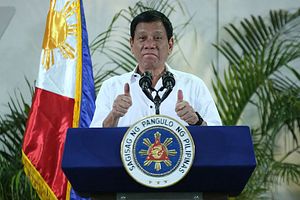Philippine President Rodrigo Duterte is being asked by his party to run for senator, a move that will certainly upend the 2022 elections.
Under the 1987 Constitution, the president can only serve a single six-year term, but this didn’t stop the PDP-Laban ruling party from nominating Duterte as its vice presidential candidate. However, some legal scholars have opined that Duterte is constitutionally barred from running even for vice president and warned that his candidacy could be questioned in the courts.
Citing a lack of public support and personal qualification, Duterte did not push through with his vice presidential candidacy and instead endorsed Senator Bong Go as vice president. Go is his former aide but continues to accompany him in public events even after becoming a senator in 2019.
Even though the filing of candidacies ended on October 8, the final list of candidates will not be known until November 15, the deadline for filing substitutions for candidates who may withdraw from the election race and be replaced by their parties. Duterte notoriously used this unusual tactic in 2015 when he consistently denied that he was eyeing the presidency and rejected all offers for him to run — until he was substituted in for another presidential candidate at the last minute.
All eyes are on Duterte’s daughter Sara, who has topped election surveys, but decided in the end to run for her third and final term as Davao City mayor. Her supporters, however, are still expecting her to substitute in for another candidate like her father did in 2015. It is interesting to note that she has categorically denied that she is planning to run for president but stayed mum about the vice presidency, which is elected separately in the Philippines. She also publicly supported the presidential bid of former Senator Ferdinand “Bongbong” Marcos Jr., son of the late dictator Ferdinand Marcos.
If Sara Duterte aims to run for vice president, will Go give way, even though he has already announced that he is firm on continuing his candidacy? Or will Sara aim for the top position and replace Senator Bato dela Rosa, the current presidential candidate of the ruling party?
Further complicating the political landscape is the suggestion of the ruling party for President Duterte to run for senator. Even Go has welcomed this proposal and hinted that Duterte would be a better legislator compared to incumbent senators who are conducting an investigation into the alleged anomalies involving the pandemic expenditures of the government. It is doubtful whether Duterte would appreciate the role of a legislator, however, because he almost resigned his position when he was a congressman in 1999.
It is also difficult to ascertain whether Duterte’s party colleagues are serious in their proposal to field the president as a senatorial candidate. It is still possible that Duterte would pursue his earlier plan to run for vice president by substituting for Go.
Perhaps the intent of Duterte and the ruling party is to confuse their political rivals. But in being vague about their strategy, they are also sending mixed signals to their supporters.
Duterte might be hoping to replicate his successful campaign in the 2016 election, but the circumstances are entirely different today.
First, he can no longer claim to be an underdog candidate with little political clout. Second, his penchant for “shock and awe” sound bites, like pledging to solve crime in three to six months, no longer hold water for voters who were frustrated waiting for results in the past five years. His reputation as a man of action was exposed as hype when he was accused of bungling the country’s pandemic response.
Duterte’s maverick style of governance is now suspected of circumventing the law and allowing graft to flourish. Even the act of electoral substitution is now viewed with derision as legislators scramble to amend the law in order to prohibit the controversial practice.
Duterte’s options are now limited and the latest pronouncement about him running for senator is another indicator that the ruling party has failed to offer a complete senatorial line-up.
Duterte may think his indecision whether to run for vice president or senator is working to his advantage by blindsiding the opposition, but many observers have already pointed out that his real motivation is to protect himself and his family after the end of his term as president in 2022. Aside from losing legal immunity when he becomes a regular citizen, Duterte could be brought to the International Criminal Court to face charges of committing crimes against humanity.
Duterte is not acting like a leader ready to give up power and secure his legacy but a frantic politician negotiating for political survival.

































